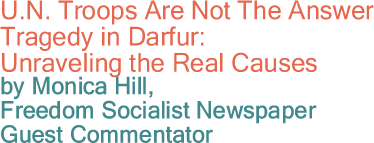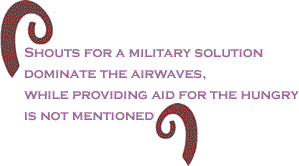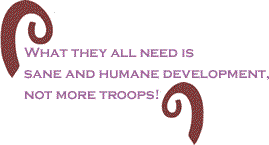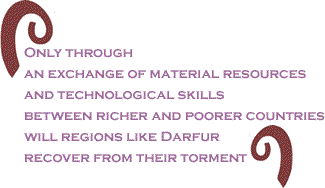
|
|||||||||||||||||||||
 |
|||||||||||||||||||||
 |
|||||||||||||||||||||
 |
|||||||||||||||||||||
 |
|
|
A few years ago, what people in the U.S. knew about Sudan, the largest country in Africa, likely came from the movie Lawrence of Arabia. Most had never heard of Darfur, the suffering, tumultuous region in western Sudan. Today, Darfuris are caught in a grim conflict that has killed up to 400,000 people and displaced at least 2.5 million. The U.S. press and politicians are obscuring the historical roots of the agony, trying to manipulate public opinion about how to help. Shouts for a military solution dominate the airwaves, while providing aid for the hungry is not mentioned. Fundamentally, Darfuris are straining against predatory world imperialism and a repressive central government, which have together created a deadly civil war. An inexorable expansion of the Sahara Desert intensifies the suffering. The scope of the dilemma begs for revolutionary answers. Colonial legacy breeds civil war Darfur’s conflict today is an extension of Sudan’s war between the north and south, Africa’s longest civil war. Its origin goes back to the colonial era when Britain administered northern and southern Sudan as separate colonies. British capital went largely to northern Sudan, which enabled the Nile Valley to develop industrially. The rest of Sudan was left out, exploited and impoverished, the people trying to sustain themselves on modes of production like herding and farming that became less and less viable. After independence in the mid-1950s, the central government reinforced British policies of segregation of the north from the rest of the country and of neglect and vicious suppression of the east, west and south. At various times, rebel groups mounted protests and armed revolts against the government. The strongest defiance came from the south, from 1955 to 1972, and again from 1983 to 2005. Then, the Islamic fundamentalist dictatorship of Omar Al-Bashir signed a peace agreement with one of the groups, the Sudan People’s Liberation Movement, which joined the government. Along with the settlement came 10,000 U.N. "peace-keeping" troops - and a shift of the fighting to Darfur. Race is not to blame With starts and stops, the war now raging in Darfur has been going on since 2001. Just as in the south, the have-nots in Darfur are rebelling against poverty and discrimination by the central government in Khartoum. The government strategy is to fund vicious counterinsurgent mercenaries, drawn from nomad tribes and called Janjawid. Terrified, unarmed civilians are the bulk of their victims. The White House and U.S. media persist in characterizing this war and its barbarities as "Arab" vs. "Black African." But this is simply not true. Such deliberate mischaracterization is being done to further demonize Arabs and Muslims and thereby aid the U.S. "war on terror," and to promote military intervention.
As Professor Mahmood Mamdani, director of African Studies at Columbia University, points out in an article published in Black Commentator, "All parties involved in the Darfur conflict - whether they are referred to as ‘Arab’ or as ‘African’ - are equally indigenous and equally black. All are Muslims and all are local. The so-called Arabs of Darfur are Africans who speak Arabic. The real roots of combat are not racial or ethnic but political and economic.
Underdeveloped industrially, Darfur has no jobs for displaced nomads and farmers. Too many men end up in local militias or the Sudanese army. The women and children and elders are left behind, defenseless against raids, rape and plunder. What they all need is sane and humane development, not more troops! Why doesn’t anybody mention oil? In most discussions about the crisis, the subject of oil doesn’t come up. But it is Sudan’s largest export and the reason for U.S. "concern" for Darfur. A consortium of Chinese and other companies finished an oil pipeline in 1999. Since then, oil has turned Sudan into one of the fastest growing economies in the world, although the wealth benefits only a select few. Sudan is the third largest producer of oil in Africa. It also has large deposits of natural gas, uranium and copper. Alas, the U.S. has no access to these riches, because the Clinton administration branded Sudan a "terrorist state" and imposed a blockade, as well as bombed its only major pharmaceutical plant in 1998. The China National Petroleum Corporation holds the only oil leases in Darfur. The U.S. wants that oil. And it wants a foothold in this region so well situated to exert military and political power over the Middle East. That’s why the U.S. favors sending U.N. troops into Darfur - and why China and France, with already established oil claims, do not. Hope for Darfur, but not through U.N. troops The White House, Democrat and Republican politicians, and their media have now turned their attention to the intense violence and misery in Darfur - several years after it actually began.
Last Sept. 17, a Global Day for Darfur, thousands demonstrated in New York. Their main call was not for aid, but for 20,000 U.N. troops. Most of them were concerned young students and anti-war activists, chanting "Out of Iraq, into Darfur." They are unaware that the Save Darfur campaign is organized and financed primarily by the right wing, evangelical and Zionist groups and NGOs (non-governmental organizations) funded by the National Endowment for Democracy. Rally leaders met with George W. Bush in the White House just before the event. U.N. and NATO troops are hired to do what the empires, especially the U.S., tell them to do. From Korea to Congo, Iraq, Yugoslavia, Somalia and Haiti, the assigned role of "peacekeeper" troops has been colonial occupation and suppression of rebellious peoples, while stolen wealth flows into imperialist hands. Most of the NATO-funded African Union troops currently in Darfur are sent by vicious regimes that have themselves condoned atrocities similar to those of the Janjawid. Support for either U.N. or NATO-backed African Union soldiers in Darfur is support only for more death and destruction. Many analysts say there is no hope for Darfur. And under the rule of world capitalism, they have a point. The human, economic and environmental catastrophes besetting Darfur are an acute example of what plagues former colonies all over the world. Just as the problem is international, so is the solution. Only through an exchange of material resources and technological skills between richer and poorer countries will regions like Darfur recover from their torment. But, under the system of production for profit, equitable exchange is excluded. Here and now, support for Darfur must include demanding the end of sanctions against Sudan along with immediate humanitarian relief and development aid for projects like irrigation. Aid that comes from governments must be unconditional. And, if there is any possibility of forming committees of women, farmers, herders and workers to make decisions about aid distribution, this should be fought for. But just as important as calling for emergency aid is organizing for international socialism. This can be the only real foundation for a stunning recuperation by human beings and nature, in Darfur and beyond. Monica Hill writes for the Freedom Socialist Newspaper. |
|
| Home | |
| December 7, 2006 Issue 209 |
||||||||||||||
|
||||||||||||||
| Printer Friendly Version in resizeable plain text format | ||||||||||||||
 |
||||||||||||||
|
||||||||||||||
 |
||||||||||||||
 |
||||||||||||||
 |
||||||||||||||
 |
||||||||||||||
| |
||||||||||||||
| |
||||||||||||||






























